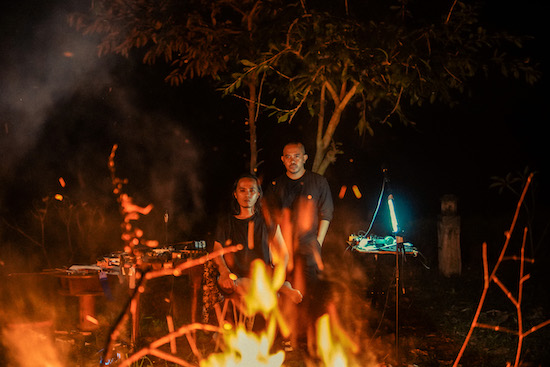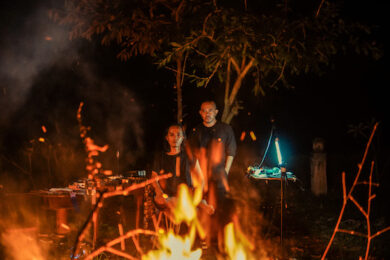Photo: courtesy Phantom Limb
Senyawa’s chaotic approach to experimental music owes a lot to the cut and thrust of heavy metal. Alkisah is a destructive, scattered, and dramatic record, and the band’s previous experiments with metal royalty are teased through every pore. But their real power comes from a clear understanding of the emotional intentions of metal’s loudest and most devastating form, and by transposing moods and textures to a different set of instruments, they get to the same sinister conclusion through radically different methods.
The core emotional intention on Alkisah is to create a mortifying sense of dread, which they achieve through clashing vocals, sinister repetition of single notes and bassy percussion rolls, held to create tension. The homemade instruments bridge the gap between traditional folk styles and contemporary music; the bamboo creations create an esoteric sound, enormous stringed instruments and arcane percussion clattering over one another. There’s something particularly spiky and abrasive here that immediately shares common ground with heavy metal; it’s heard in every idea that strains toward ending in raw noise and every unusual sound that feels like it was engineered deliberately to create discord. Although the presentation is radically different, the mode closest to their aims is doom metal, which seeks to create an oppressive, dour mood and does so with lugubrious riffs, thunderous, plodding drums, and phenomenal volume.
This connection to doom’s particular brand of darkness is perhaps unsurprising given their most recent collaboration with Sunn O)))’s Stephen O’Malley, a man who works on the furthest fringe of extreme metal. Here at tQ, we labelled their collaboration, Bima Sakti, as “visceral and elemental.” Comparing the two, that record summoned a dour mood very much in the vein of O’Malley’s usual work, using the guitar as a weapon rather than an instrument, creating languishing, drawn-out dronescapes with Senyawa’s instrumentation peppering the flailing, stuttering guitars. Dense and foreboding, explorative and abstract, it’s a punishing listen. On Alkisah, Senyawa take that sense of exploration but dial the heavy metal thunder back a step, giving the record a much broader approach to convey emotional nuance.
By eschewing the reliance on pure sonic power, Senyawa are able to use a much broader array of moods that contribute to a more colourful picture of darkness. Importantly, although these moods undulate, they all have one focus, which is the creation of impending doom; the voices raised in celebration gradually become mired in a grim swamp, and the clatter of voices which could be welcoming and warm quickly morph into indistinct chaos. Elsewhere the record is dark, foreboding, and scattered; there are parallels to be drawn from doom’s own use of non-traditional song structures and textures, which gives them the scope to expend our suffering.
The Sunn O))) mode of creating terror is concerned with a flattening of human spirit and the single-minded creation of the darkest black and the loudest noise, through which no light can escape. In comparison, Senyawa’s broader focus gives them a little more breathing room to guide the audience through emotionally fraught passages rather than immediately bludgeoning them to a pulp. As the range and scope of instruments progresses, the mood changes from celebratory and triumphant to foreboding and sinister, and it becomes more apparent that the end goal is total sonic devastation. By the wash of noise that concludes ‘Menuju Muara’, things have progressed to imperious and deathly. This journey is significantly more nuanced than their much louder cousins, although at times when they both fade into formlessness, it’s only decibels that separate them.
It’s thrilling to hear a record that outstrips O’Malley’s vision. His take on heavy music is a gold standard for experimental metal, and for good reason. But command of volume isn’t the only thing that can summon these destructive moods. Nor does Alkisah hold back at any point; there’s a venom in every held note which has a completely different flavour to O’Malley’s approach. Plus, knowing that the instrumentation is purpose-built gives this more gravitas; this was designed purely to make us unsettled, like a folksier Author & Punisher.
On that note, their mix of custom-made and traditional instruments presents a dazzling array of sounds and textures. To an outsider, or one more familiar with the Western heavy metal canon, their sound is a whole world of unusual and thrilling new noises by which menace can be communicated. Of course it does the record a disservice to consider such sounds a novelty; Senyawa’s command of mood and tone exists far beyond simply surprising unexpected listeners with new sounds. Such effects wear off, whereas this has significantly more staying power, and a better command of darkness.
Ultimately, Alkisah is as much of a cathartic experience as anything by Sunn O))), Neurosis or Converge. Understood through a heavy metal lens they’re a thrilling addition to the canon, but their power and intentions go much deeper into the emotional root of heavy metal.



